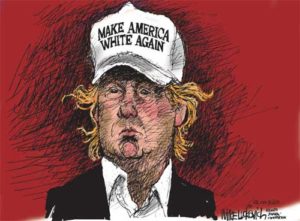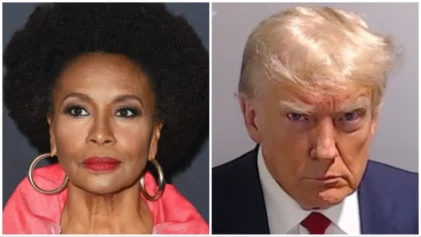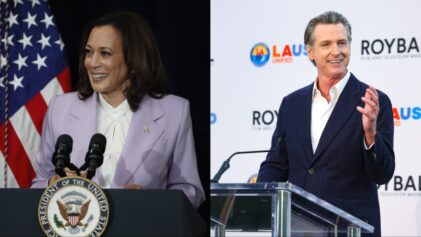In early 2007, it was clear. The Republican Party was going to face a Democratic presidential candidate unlike any they have ever faced before: the first woman or African-American. Not only would the candidate be different, but whichever Democrat won, it would be a historic election, one with which they could not contend as all their candidates were ultra-conservative, white, male, fairly old(er), and of substantial wealth.
By February of 2008, the Republican Party decided a rebranding was in order to “protect the GOP from charges of racism or sexism in the general election,” and to evolve their image of being the party of the white elite. No sooner than Jack Kemp, a 1996 Presidential candidate, warned the Party that rhetoric seen as racist and sexist could brand them an “all white country club Party,” and eschew African-Americans, Latinos, and women even further away, it happened. Barack Obama, a then Senator from Illinois, won the Iowa caucus.
Many Republicans had presumed Hillary Clinton would be the Democratic candidate, however, the tide began to shift rather swiftly as Obama began racking up win after win in Democratic primaries in states where there were large pockets of African-American and young voters. Having won more delegates than Clinton in the primaries, it was clear that Obama was going to be the Democratic nominee for President of the United States.
With this revelation, the GOP candidates started to speak, as did some Democrats, and it wasn’t so much in favor of one candidate, but against another.
They said that Obama was “arrogant,” “un-American,” “not from here,” and the biggest insult they could think of was to call him a “terrorist,” and a “Muslim,” as if practicing a faith other than Christianity was something to be ashamed of.
Obama not only beat the GOP candidate, John McCain, he won by an overwhelming majority. His win was due in large part to a historic turn out from African-American and Latino voters. President Obama won 98 percent of the Black vote in 2008. It was a sign that establishment Republicans, the heart of the Party could not ignore. And they knew why: America’s racial demographics were changing.
It can be said that the Republicans lost their Party, in essence, when they attempted to counter the historic nomination on the Democratic side with their own historic candidate. Their error, however, was in whom they chose.
Sarah Palin was the VP candidate from hell. The Party could not control her and she intentionally reached for the racist wing of the GOP. She fueled their ire as much as a potential Obama win did. Going unchecked, Palin would wink and nod as she spoke the filth of bigotry, using phrases such as “shucking and jiving,” that were not unfamiliar to African-Americans or the people who hate non-whites.
It wasn’t long before the establishment GOP lost the reigns over the Party, and basically surrendered control to a new faction that was emerging and calling themselves the Tea Party. The Tea Party began to run its own candidates, Sarah Palin became their darling, and things in the American political discourse got uglier than they have ever been. Photos began to surface of Tea Partiers fictively lynching symbols of Obama, they began calling Michelle Obama out of her name, and we were finally having to come to terms with the fact that “post-racial” America was actually flooded with racism, not just in the south, but everywhere.
After a clear defeat in the 2008 presidential election, the GOP did not want to suffer another embarrassing loss for the presidency again and immediately began damage control as they eyed midterm elections and the 2012 presidential race.
Their first action was to vote Michael Steele, former Lt. Governor of Maryland and candidate for Senate, as the first ever African-American to chair the Republican National Convention. The hope was that Steele would be able to wrangle more African-Americans into the Republican Party. Steele spent a lot of time attempting to appeal to his own stereotyping of Black voters. He promised his strategy for racial inclusion would be “off the hook,” “surprise everyone,” and appeal to “urban-suburban hip-hop settings.”
However offensive Steele’s assumptions about Black voters were, he too, was also met with racism from within the ranks of the GOP— from Rush Limbaugh calling him “inarticulate,” to other Black conservatives branding Steele “an embarrassment.” Nonetheless, he was crowned the Party’s “token Negro” by the likes of Ann Coulter who chided the Democrats by exclaiming “our Blacks are better than yours.” Steele served two years as chairman, and ultimately failed in his task to diversify the Party.
It was evident, by this point, that the historic nomination and presidential win of Obama solidified the Republican Party as one of insufferable hate, saddled with racists who were no longer strewn along the fringes; they were now occupying the Party’s core and steering it in a very ugly direction.
GOP strategists began to see the future implications and the possible demise of the Party based on polling that showed the Republicans to be viewed as insensitive to the needs of women, strongly anti-black, and anti-minority, period. Moderates in the Party urged candidates to sanitize their rhetoric and refrain from speaking in ways that were blatantly spiteful, and to specifically avoid the coded language of racism they adopted in the 1960s.
For every candidate that “misspoke” and offended every “other” imaginable, senior leaders in the Party would publicly condemn the comments, but the condemnation was wrought with inconsistency. Still, the leaders of the GOP, who were able, maintained some semblance of control over a situation that was rapidly spinning out of control.
At least until 2010, they did.
In 2010, the South Carolina Republican Party declared Nikki Haley, their nominee for governor. Haley was poised to become the first female and first minority to hold the highest office in that state. Haley’s parents are immigrants from India, a fact that was widely known, but often downplayed by Haley, herself. Haley had endorsements from Palin and others involved in the Tea Party movement. She was the quintessential Republican candidate: ultra-conservative, pro-life, pro-gun. She was a “hard line” Republican and South Carolina Republicans loved her…well, most did.
On an Internet political talk show, Pub Politics, South Carolina state senator (at the time), Jake E. Knotts said, “We’ve already got a raghead in the White House, we don’t need another raghead in the governor’s mansion,” in discussing Haley’s nomination.
Immediately, the South Carolina Republican Chairwoman, Karen Floyd, moved to apologize and explicitly condemned this and “any use of racial slurs.” Knotts, himself, was not so apologetic, stating, “Since my intended humorous context was lost in translation, I apologize. I still believe Ms. Haley is pretending to be someone she is not, much as Obama did, but I apologize to both for an unintended slur.”
A member of Sons of Confederate Veterans, who lived his entire existence in the rural south, Knotts’ comments were not an “unintended slur,” he was deliberate in expressing his prejudice against Black and brown people, as well as Muslims and Sikhs (the latter being the faith from which Haley converted from). Knotts was also known to be as inflammatory in his speech on the senate floor as Strom Thurmond, a former South Carolina senator and staunch segregationist who once ran for president as a Dixiecrat and secretly fathered a Black child.
Knotts’ (un)apology, quickly became the norm for the GOP. Apologizing and feigning ignorance became the standard practice. Republicans would apologize for outrageous and offensive comments, such as Mitt Romney’s “47 percent,” and Todd Akin’s “legitimate rape” refrain, by saying they were “misunderstood” or “didn’t understand the impact” of their words, when it was obvious that they did. And they all apologized.
Except for one.
In 2011, Donald Trump began talking, and he was specific in who his message was crafted for: an increasingly shrinking percentage of white voters. Not just white voters, but white voters who not only disliked President Obama, but those who loathed him with the fervor of a Bull Connor or George Wallace; those whose hate for the Black leader of this nation ran so deep, it sustained them as much as the air they breathed.
Trump began working the Republican base by adopting their rhetoric and using the same tactics he used to promote his show, The Apprentice, to “expose” President Obama, the way Knotts attempted to expose Gov. Haley. He chose to paint him not just as un-American, but as an illegitimately elected president. Insofar as holding a press conference to reveal how on some secret quest he and some “investigators” found in Hawaii that would point to the “truth” behind Obama’s identity. What he found rang as hollow as the Al Capone vault Geraldo Rivera unearthed in 1986. Yet, he persisted in presenting a whole lot of nothing to those who were eagerly waiting for something that would lead to impeachment. Unlike Rivera, Trump was defiant in his defeat saying, he couldn’t reveal all he had found, but that he found something where there was nothing. For most thinking people this was an indication that Trump was testing the waters, once again, for a presidential run.
Trump had toyed with running for president before, though controversies in his marriage and with his finances always made his White House dreams elusive. America was not to a point, in the 80s and 90s, where controversy didn’t cripple a political candidate. In fact, political careers had been destroyed by controversy, so Trump backed away. However, in birtherism, he found his niche, and the one controversy that appealed to the very people he knew would be gullible enough to buy it: white people. Not just any group of white people, but those whose political leanings were totally in line with white supremacy, whether they could admit it or not.
Trump’s insistence that Obama was not born in America harkened back to one of many shameful periods in America’s history with and treatment of Black people. He brings us back to a time when African-Americans were not considered citizens or even whole humans. By blackening Obama in this respect, Trump and others like him put a spotlight on racism in America, but also on the intrinsic fear of what this author considers “unfettered Blackness.”
Unfettered Blackness is represented by people and the actions they took toward self-liberation. Unfettered Blackness is Nat Turner, Marcus Garvey, Fannie Lou Hamer, The Black Panther Party, and today, it is Black Lives Matter. Unfettered Blackness is fearless and unyielding. It is also uncompromising, as are the tactics used to destroy and discredit it. Birtherism, by Trump and the white right, is such an attempt.
To be clear, Trump is exactly what the Republicans deserve. He represents the cultural, political, economic, educational, and legal imbalances the GOP tries to protect in its messaging, and in the policies they have supported going back to the influx of southern segregationists into the Party. What Trump is doing is not unique, nor is it surprising. Rather, he is doing what politicians on the right have done for decades: running on a platform of white supremacy.
Trump has worked to offend every possible group that aligns itself with the Democratic Party and he is unflinching in his misguided belief that the very people he’s offending will make him their leader and he will win their votes. Again, Trump and the GOP are assuming that the people they insult regularly are as asleep as their own base, those who will vote against their own self-interests because the hatred for all others surpasses the desire for basic human survival.
Essentially, those who support Trump are the very people who hate President Obama. They don’t support Trump as much as they support what he says because it is in line with everything they have been saying about President Obama since he announced his candidacy in 2007.
This week Trump picked up two endorsements: one from a white nationalist group, the other from David Duke, a member of the KKK. Two of his supporters nearly beat a homeless Hispanic man to death. Trump, himself, mimicked Asians and continued to refer to women as “bimbos.” He did all of this, and still offered no plan for governing should he win the election.
And he doesn’t have to because his supporters don’t want to hear one. All they want to hear is that their world and the country they believe is theirs alone will remain white.
To them, it is all that matters.



